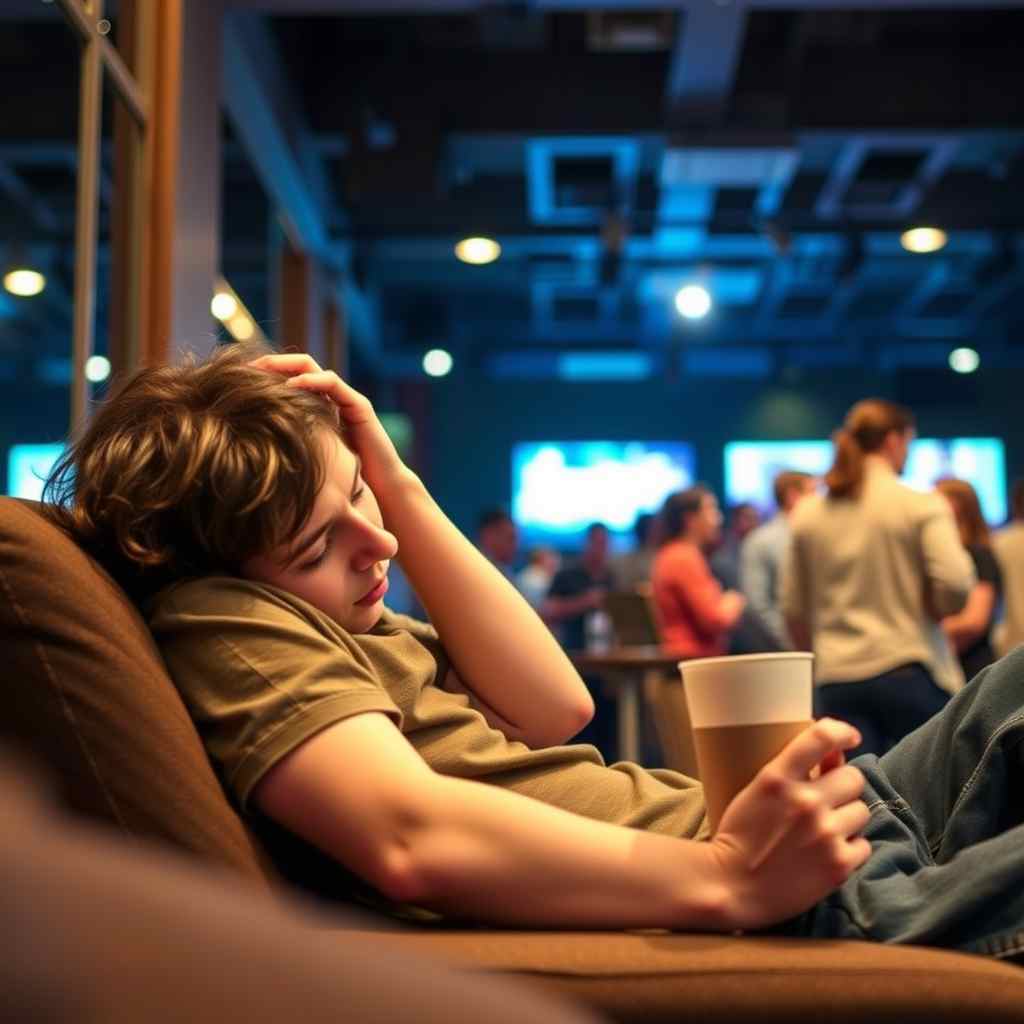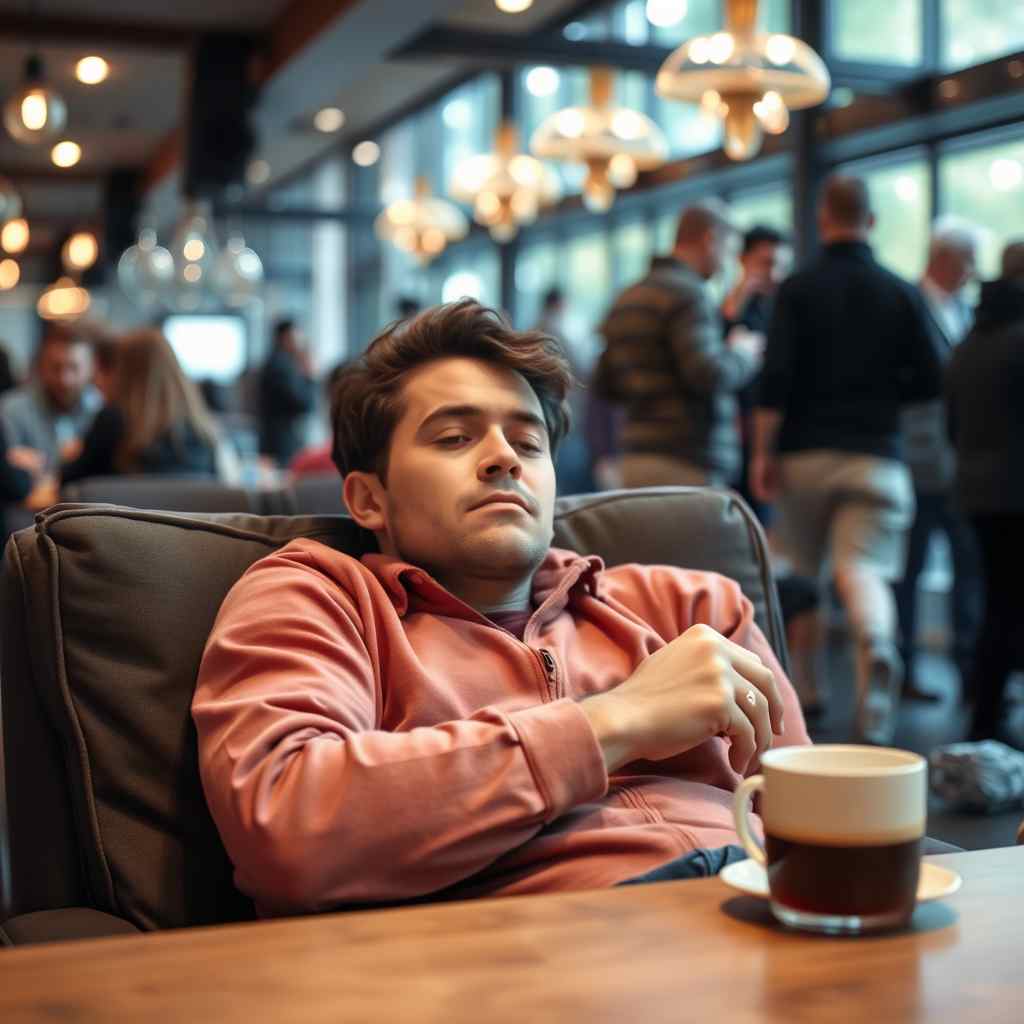Reading Time: 19 Minutes
Have you ever felt completely wiped out after a social event, even if it was just a simple get-together with friends? If you’re nodding your head, you might have experienced what is known as an introvert hangover. No, it’s not about having one too many drinks. It’s about feeling exhausted and needing some serious alone time after socializing.
Introverts are people who get their energy from being alone rather than from being around others. While extroverts might feel pumped up after a party, introverts often feel like they’ve just run a marathon. They need to recharge in a quiet place to get their energy back. So, let’s dive in and understand what an introvert hangover is, why it happens, and how you can deal with it.
What is an Introvert Hangover?
An introvert hangover isn’t about having too much fun at a party. It’s the mental and physical exhaustion introverts feel after spending too much time socializing. Picture this: you’re an introvert who just spent hours at a noisy gathering. Now, you feel drained, like your battery is completely dead. That’s an introvert hangover.
Introverts get their energy from being alone, not from being around people. Social interactions, especially long ones, drain them. After a while, they need to retreat and recharge in a quiet space. It’s like when your phone’s battery hits 1% after using GPS, streaming music, and playing games all day. You need to plug it in and let it charge. Similarly, introverts need downtime to feel like themselves again.
You Might Like To Read: Why Introverts Are Misunderstood: 9 Key Reasons Behind The Mystery

How Long Does an Introvert Hangover Last? It’s Not Just About a Good Night’s Sleep
The duration of an introvert hangover can vary. For some, a few hours of solitude might do the trick. Others might need a whole day or even a weekend to bounce back. It depends on how intense the social interaction was and how much it drained them. Just like how different phones have different battery life, different introverts need different amounts of time to recharge.
You can’t just “sleep it off” either. While a good night’s sleep helps, it’s the quiet, alone time that really recharges an introvert. It’s like having a fancy dinner – you can’t rush through it; you need to take your time and enjoy each bite. Introverts need to savor their alone time to fully recharge.
The Psychology Behind an Introvert Hangover: Brain Science Made Simple
So, why does this happen? It’s all about how introverts’ brains are wired. Introverts process things deeply. Their brains react more to external stimuli, which means social interactions can quickly become overwhelming. It’s like having a super-sensitive microphone that picks up every little sound. After a while, the noise just becomes too much, and you need to turn it off.
In introverts, the brain’s reward system works differently. Social interactions don’t give them the same energy boost that extroverts get. Instead, introverts find solitude more rewarding. Imagine if your favorite food was pizza, but every time you had to eat cake at a party. Sure, cake is fine, but it’s not what truly satisfies you. For introverts, alone time is their pizza – it’s what makes them feel good and recharged.
You Might Like To Read: Why Introverts Hate Small Talk: 9 Key Factors Behind Their Discomfort
Neurotransmitters like dopamine also play a role. Introverts have a lower threshold for dopamine, meaning they can get overwhelmed easily by too much social interaction. It’s like if your tolerance for caffeine was super low – one cup of coffee could make you jittery and uncomfortable. Introverts need to manage their dopamine levels by balancing social time with plenty of quiet time.
Signs and Symptoms of an Introvert Hangover
So, how do you know if you’re experiencing an introvert hangover? Here are some telltale signs. First, you feel utterly exhausted, like you just ran a marathon, even if all you did was chat at a party. You might also get headaches, similar to the ones you get when you’re dehydrated or haven’t slept enough.
Emotionally, you’ll notice you’re more irritable. Little things that normally don’t bother you suddenly seem unbearable. Your patience wears thin, and you might snap at people for no real reason. It’s like your brain’s fuse box gets overloaded, and everything starts short-circuiting.
Behaviorally, you start avoiding people. You cancel plans, ignore calls, and just want to be alone. It’s not that you dislike your friends or family; you just need a break. Think of it like needing a timeout to gather your thoughts and energy. You might also feel anxious or overwhelmed, finding even simple conversations draining.
Social Situations That Can Trigger an Introvert Hangover
Certain social situations are more likely to trigger an introvert hangover. Big parties and crowded events are major culprits. The constant noise and interaction can quickly drain an introvert’s energy. Imagine being in a room full of people all talking at once; it feels like sensory overload.
Even smaller gatherings can be tiring if they last too long or if there’s a lot of small talk. Small talk is especially draining for introverts because it feels shallow and repetitive. They prefer deeper, more meaningful conversations. So, chatting about the weather for hours can leave them feeling wiped out.
Work events and networking sessions are also tough. These require a lot of social energy and can make introverts feel like they’re “on” all the time. It’s like performing on stage – fun for a bit, but exhausting if you have to do it for too long. Even family gatherings can be draining, especially if there are a lot of people or if there’s pressure to interact with everyone.
You Might Like To Read: Why Introverts Are So Attractive? – 9 Reasons Behind Being Charming
What is an Introvert Hangover Test? Because Knowing is Half the Battle
An introvert hangover test helps you figure out if you’re experiencing an introvert hangover. It’s a way to check in with yourself and see if you need to recharge. There are several self-assessment tools available online, which ask questions about your energy levels, mood, and social interactions.
For instance, the test might ask how you feel after a social event. Do you feel tired or energized? Are you looking forward to alone time, or do you want to keep socializing? Your answers can help you recognize the signs of an introvert hangover.
Knowing the signs is half the battle because it helps you take action before you’re completely drained. Once you recognize the symptoms, you can plan some alone time to recharge. It’s like knowing you’re getting a cold – if you catch it early, you can rest and recover faster. So, taking an introvert hangover test can be a handy tool to manage your energy levels and ensure you stay balanced and happy.
How to Bounce Back from an Introvert Hangover: Recharge and Reset
When you find yourself in the midst of an introvert hangover, the best way to bounce back is to take some quality alone time. Find a quiet space where you can relax without any interruptions. Think of it as a mini-vacation for your mind. Reading a book, watching a favorite TV show, or simply sitting in silence can help you recharge.
Engage in activities that make you feel calm and happy. Take a walk in nature, do some gentle stretching, or listen to soothing music. It’s like hitting the reset button on your brain. You’ll feel your energy levels slowly coming back up.
Sleep is also important. Make sure you get plenty of rest, as your body needs it to recover from social fatigue. Drinking water and eating healthy foods can also help you feel better faster. It’s about treating yourself with the same care you would if you had a physical hangover – lots of rest, hydration, and comfort.
You Might Like To Read: Why Are INFJs So Rare? ( 9 Interesting Facts About INFJs)
How to Avoid Introvert Hangover: Prevention is Better Than Cure
Avoiding an introvert hangover is all about planning and knowing your limits. Before you head to a social event, set a time limit for how long you’ll stay. Give yourself permission to leave early if you start feeling drained. It’s like having an escape plan – knowing you can leave whenever you need to makes socializing less stressful.
Say no to invitations when you’re not up for it. You don’t have to attend every event. Pick and choose the ones that matter most to you and skip the rest. It’s okay to prioritize your well-being over social obligations.
Make sure to schedule alone time in your day, especially after social activities. Treat it like an important appointment. This way, you’ll always have time to recharge. Also, communicate your needs to friends and family. Let them know that you might need some quiet time after a big gathering. Most people will understand and respect your needs.
You Might Like To Read: 18 Benefits Of Being An Introvert: Which Often Go Unnoticed
How Does an Introvert Hangover Affect Your Life? It’s More Than Just Being Tired

An introvert hangover doesn’t just make you tired; it can affect your entire life. When you’re drained, it’s hard to concentrate and be productive. Tasks that usually take minutes can feel like they take hours. It’s like trying to run a marathon on an empty stomach – you just don’t have the energy.
Your mood can also take a hit. You might feel more irritable and less patient with others. This can strain your relationships, as you might snap at friends or family without meaning to. It’s not that you’re upset with them; you’re just overwhelmed.
Long-term, if you don’t manage your energy well, you might start to avoid social situations altogether. This can lead to feelings of isolation and loneliness. It’s important to find a balance between socializing and alone time so that you can enjoy both without burning out.
What to Do Next When the Introvert Hangover is Gone? Back to the World
Once you’ve recharged and the introvert hangover is gone, it’s time to re-enter the world. But do it gradually. Start with smaller, low-key social interactions before jumping back into big events. Think of it like dipping your toes in the water before diving in.
Reflect on what caused the hangover in the first place and make adjustments. Maybe it was too much small talk or a crowded venue. Use this knowledge to plan better for the next time. Communicate with friends and family about what works best for you. They’ll appreciate knowing how to help you stay comfortable and happy.
Finally, maintain a good balance. Keep an eye on your energy levels and don’t hesitate to take breaks when needed. It’s about finding a rhythm that allows you to enjoy socializing while also taking care of your introverted nature. With a little planning and self-awareness, you can have the best of both worlds.
Conclusion: Embrace Your Introvert Superpowers and Manage Your Hangovers
Understanding what is an introvert hangover is the first step to managing it. If you recognize the signs, know how to bounce back, and learn to avoid triggers, you can navigate social events without feeling completely drained. It’s all about balance and knowing your limits.
Remember, it’s okay to need alone time. It doesn’t mean you’re antisocial or don’t enjoy being around people. It just means you recharge differently. So, embrace your introverted nature and take care of your energy. Your friends and family will appreciate you even more when you’re feeling your best.
Feel free to share your own experiences with introvert hangovers in the comments. Let’s create a space where we can support and learn from each other. If you have tips or tricks for managing social fatigue, we’d love to hear them. Together, we can make socializing a more enjoyable and less exhausting experience for everyone.
Image Credit: AI
If you like the post, then please don’t forget to share with your friends.
Some Of The Previous Posts



